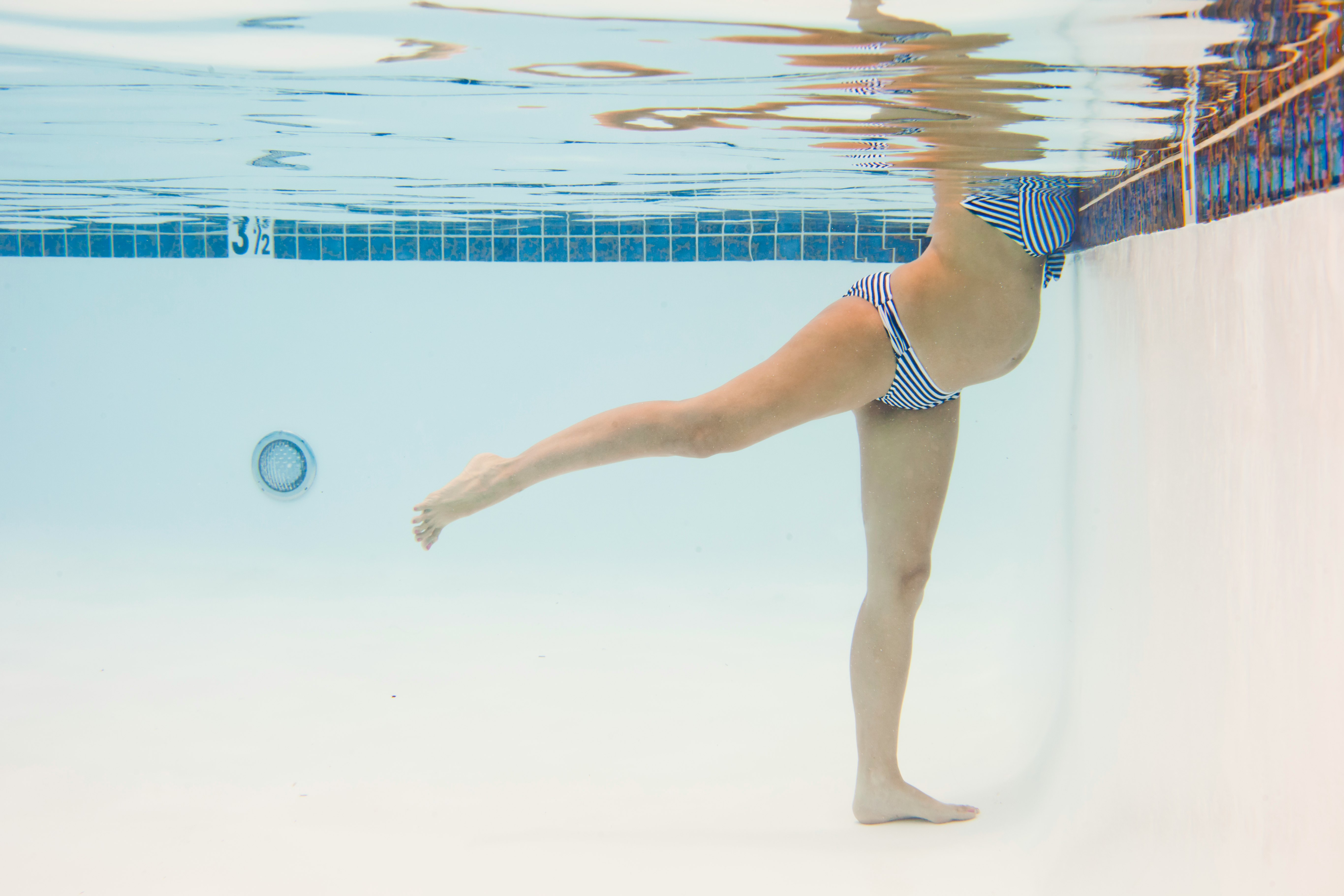
When you’re super pregnant with the end in sight, it’s pretty normal to want to not be pregnant anymore — especially in the summer months. There are few things worse than being super pregnant in the summer heat, but a pool helps. Even better is knowing if swimming can induce labor so you can evict your baby and avoid the sweltering weather. Why not take advantage, right?
Can Swimming Induce Labor?
While swimming is great for pregnant people in general, unfortunately, it cannot induce labor, according to OB-GYN Idries Abdur-Rahman. “While we do not completely understand all of the mechanisms involved in initiating labor, we do know that hormonal changes play a large role,” he tells Romper in an email interview. “Even your more strenuous exercises do not appreciably change hormone levels, and swimming definitely doesn’t. If anything, the reduced gravity environment of the swimming pool, which reduces pressure on the cervix, may make labor onset even less likely in the short term.”
So not only does it not help induce labor, but it can even prevent labor from continuing. But there are a lot of advantages to swimming throughout your pregnancy beyond keeping yourself cool.
How To Naturally Induce Labor
Monique Cowan, a birth and postpartum doula and family coach, tells Romper, “Movement such as squats, dancing, lunges, bouncing on an exercise ball and walking have been known to get labor going. Nipple stimulation and sex are more fun ways to induce, as it causes a surge of oxytocin which causes the uterus to contract.”
Again, it’s those hormones that need to get going in order for you to go into labor. “Most natural methods of labor induction involve stimulating increased levels of hormones called prostaglandins and oxytocin,” Abdur-Rahman says. “These hormones soften and dilate the cervix while also stimulating contractions of the uterus — two things that you need to induce labor.”
Abdur-Rahman adds that using a breast pump is one of the more simpler (albeit not as fun) ways to stimulate your nipples for that oxytocin and prostaglandins release.
“Red raspberry leaf tea has been found in studies to help the cervix soften and dilate — preparing it for labor — while also stimulating contractions that can help kick labor off, and acupuncture and acupressure have both been found to help stimulate labor,” Abdur-Rahman says. “There are multiple acupoints, especially in the feet, that stimulate labor.”
However, Cowan says it’s super important to remember that if you still want to try to self-induce, you need to wait until you’re at least 40 weeks along. “All of these methods may or may not jump start labor and can cause some form of discomfort,” she says. “The issue with inducing is that, unless a mother knows exactly when she conceived, she may actually be inducing earlier than 40 weeks. The problem with this, of course, is that baby may not be done with brain and lung development.”
Benefits of Swimming While Pregnant
And while it may not get labor started, swimming is still super beneficial and safe for you. Patricia A. Evans, a nurse practitioner and certified midwife, tells Romper that swimming gives you relief from the heaviness from your uterus, and you’ll feel weightless from the buoyancy of the water. Other reported benefits to swimming while pregnant include relieving ankle and foot swelling, easing sciatic pain, reducing morning sickness, keeping you cool, and improving your endurance — which will help when it’s time to push the baby out, according to What to Expect.
Chlorine & Pregnancy
And don’t panic about the water itself — Evans says that chlorine in a swimming pool is safe for both mom and baby. In fact, Abdur-Rahman says, “Chlorine serves a very important purpose in swimming pools, and swimming in unchlorinated water would be significantly more dangerous.”
But if your water breaks while you’re in a swimming pool, or if you want to jump in a pool after your water breaks to help those muscle contractions before delivering, that’s definitely not recommended. “Firstly, amniotic fluid is a bodily fluid, and it would not be advisable to intentionally deposit any bodily fluid in a shared pool or other body of water,” Abdur-Rahman says. “Secondly, even when chlorinated, there are bacteria and other bugs in pool water. Your bag of water is the main barrier between your baby and the germs of the outside world. Swimming after the bag of water has broken invites germs to enter the uterus, which can result in a maternal or fetal infection.”
Finally, Abdur-Rahman warns, “If you are swimming when your bag of water breaks, you should get out of the pool immediately and contact your healthcare provider.”
While there are many other benefits to swimming in a pool while pregnant, unfortunately, inducing labor isn’t one of them. But do enjoy it to stay cool and to relieve pressure on your joints and uterus during pregnancy. Your body will thank you.
Experts:
Dr. Idries Abdur-Rahman, OB-GYN, author of Everything You Ever Wanted to Know About Pregnancy (But Were Too Afraid or Embarrassed to Ask, and one-half of the Twin Doctors from TwinDoctorsTV.
Patricia A. Evans, NP, CNM, nurse practitioner and certified nurse midwife at MemorialCare Medical Group in Fountain Valley, California.
Monique Cowan, a birth and postpartum doula and family coach.

0 comments:
Post a Comment